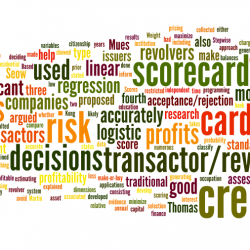Using Logistic Regression to Estimate Credit Card Profitability
So, Thomas, Seow, and Mues (2014) developed a logistic regression model for estimating the profitability of consumers’ use of credit cards using a transactor/revolver scorecard and explained how such a scorecard can be used as part of a risk assessment system. Building a scorecard that enables credit card issuers to classify an applicant as either good (low risk) or bad (high risk) has been the traditional approach to deciding whether or not to extend credit. According to the authors, credit card companies could better inform their decisions by also distinguishing between transactors and revolvers, or between those who pay off their balances to avoid interest charges and those who do not. The authors argued that while transactors are inherently good, they are also less profitable than revolvers and by scoring applicants along both good/bad and transactor/revolver dimensions can help credit card issuers make pricing decisions and more accurately estimate profits.


